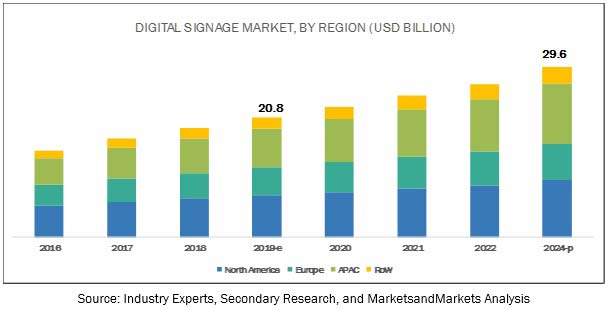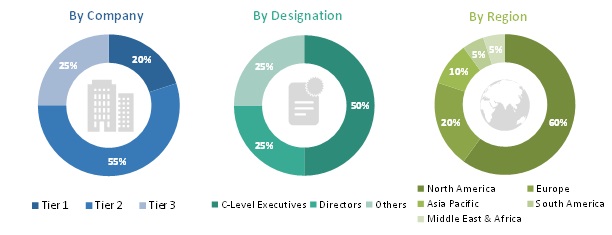The report "Triple Offset Butterfly Valve Market by Material (Stainless Steel, Cast Iron, Cryogenic, Alloy Based), Valve Size, Industry (Oil & Gas, Water & Wastewater Treatment, Energy & Power, Chemicals), and Region - Global Forecast to 2025", is expected to grow from USD 2.8 billion in 2019 to USD 3.6 billion by 2025, at a CAGR of 4.1%. Rising need for tight shutoff, light in wieght, high pressure handling capacity with lower installation cost in critical processes, growing demand for energy & power generation in Asia Pacific, increasing adoption of valves in oil & gas industry, and growing urbanization are the major driving factors for the market’s growth during the forecast period.
• Download Informational PDF Brochure :-
https://www.marketsandmarkets.com/pdfdownloadNew.asp?id=73405719
https://www.marketsandmarkets.com/pdfdownloadNew.asp?id=73405719
Browse 102 market data Tables and 53 Figures spread through 163 Pages and in-depth TOC on "Triple Offset Butterfly Valve Market"
Oil & Gas to account for the largest size of the triple offset butterfly valve market from 2019 to 2025
Oil & gas is expected to be the key end-user industry for the triple offset butterfly valve market. In oil & gas process plants, there are three major process operations—upstream, midstream, and downstream, and triple offset butterfly valves find applications in all three operations.
Triple offset butterfly valves provide process control support, right from the extraction of crude oil till it reaches to the end customers through oil refineries, oil terminals, and depots. They have become key components in the offshore and onshore oil and gas production owing to the high pressure and adverse corrosive conditions experienced within production plants and refineries.
Stainless Steel to hold the largest market share during the forecast period
Steel offers efficient mechanical properties and good resistance to stress corrosion and sulfides. Carbon steel offers high- and low-temperature strength. Carbon steel valves can be used in many locations where extreme pressure and extreme temperature make other materials unusable. Carbon steel is used in the manufacturing of various types of triple offset butterfly valves. Also, the rising demand for high-quality triple offset butterfly valves in food & beverages and chemicals industries to mitigate the threat of contamination will drive the market for stainless steel triple offset butterfly valves during the forecast period.
Asia Pacific to hold the largest share of the triple offset butterfly valve market from 2019 to 2025
APAC held the largest share of the overall triple offset butterfly valve market in 2018. The triple offset butterfly valve market in APAC for the water & wastewater treatment industry is growing at a significant rate, and a similar trend is likely to be observed in the coming years. Dense population and increasing per capita income in this region, along with large-scale industrialization and rapid urbanization, are the major factors driving the growth of the market in this region. Asia consists of a few fast-growing economies, such as China, India, and other Southeast Asian countries. Owing to the increasing urban population in the region, there is a high demand for new and improved wastewater treatment systems. Therefore, there is a growing focus on using water as a resource in manufacturing and agricultural applications. Thus, the increasing need for proper utilization of water and growing demand for water and wastewater treatment techniques for water reuse create the demand for triple offset butterfly valves in APAC countries.
Emerson Electric Co. (US), Flowserve Corporation (US), Cameron (A Schlumberger Company) (US), IMI PLC (UK), and Metso (Finland) are a few of the key players operating in the triple offset butterfly valve market.
About MarketsandMarkets™
About MarketsandMarkets™
MarketsandMarkets™ provides quantified B2B research on 30,000 high growth niche opportunities/threats which will impact 70% to 80% of worldwide companies’ revenues. Currently servicing 7500 customers worldwide including 80% of global Fortune 1000 companies as clients. Almost 75,000 top officers across eight industries worldwide approach MarketsandMarkets™ for their painpoints around revenues decisions.
Contact:
Mr. Shelly Singh
MarketsandMarkets™ INC.
630 Dundee Road
Suite 430
Northbrook, IL 60062
USA : 1-888-600-6441
newsletter@marketsandmarkets.com
Mr. Shelly Singh
MarketsandMarkets™ INC.
630 Dundee Road
Suite 430
Northbrook, IL 60062
USA : 1-888-600-6441
newsletter@marketsandmarkets.com

